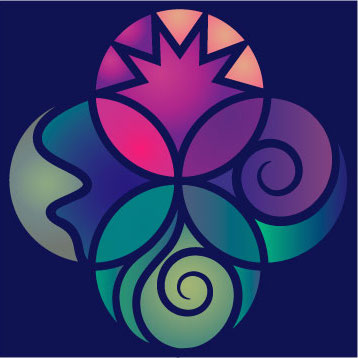Island Summer
/As the temperatures continue to climb in Central Australia, I have been remembering other summers. Two years ago in this season, I was working as a doctor on a remote Pacific Island. We stayed in a house on the side of a forest-covered mountain. Instead of the oven-hot winds that have been blowing through our desert town, Claudia and I enjoyed the sea breeze from the nearby harbour. We had a splendid view over the harbour and the nearby islands and could see the boats come and go every day. Our house was surrounded by churches — one on either side, another across the water. On Wednesday night, when the choirs were rehearsing, the sounds escalated as if they were in a celestial contest.
Claudia spent many early mornings hunting the bats with her camera. They were remarkable-looking creatures with their furry bodies (these ones had a yellow ring around their necks). The bats had complicated wings and hooky ‘hands’. Our garden was full of food for them and for us — fruiting banana trees, cannon-ball-sized breadfruit (which I really liked), taro, soursop and limes. Pigs rooted around, knocking over the bins and eating the rubbish. The piglets made us laugh.
Every Sunday, our neighbor, a strong and friendly gardener in her seventies made us a plate of food — usually fresh fish with some kinds of yams or potatoes and taro leaves, all cooked with coconut, garlic and onion. Sometimes the food was fresh out of the umu, the earth oven. When she was away for a couple of weeks, another local lady brought us food instead. Can’t have visitors going hungry!
Looking after such a generous and open-hearted people was a pleasure. It made up for the busy clinic days and the complicated work I had to do at the pharmacy. Because of the humid climate and the poverty, infections were a big problem. People worked in the bush (as they called their agricultural work) and got cuts and scratches that turned into recalcitrant ulcers. Quite a few also had diabetes, of course.
Thankfully, over the years, I had picked up some useful skills from the nurses in wound management. We even managed to heal some ulcers that were a year or two old. Patients would often come back when they were better, so I got to see how well they had healed. They usually came to our little clinic after unsuccessful visits to the beleaguered local hospital. (The hospital visits were free. It cost about $7 to see me — although I sometimes waived the fee. Passing tourists and expats had to pay $45 to see me, so they paid for our food and kept the pharmacy going).
The poor old hospital had only 2 kinds of antibiotics, both forms of penicillin. The only form of pain relief they had was paracetamol. Luckily, our pharmacy was able to bring in a range of perhaps 12 different antibiotics and it is no exaggeration to say that we saved many lives with those medicines.
A strong local woman, who serves as health worker, interpreter and community liaison, called me one Sunday because her husband, a gentle and hardworking man in his 40’s, was sick. His family had taken him to the hospital but were told there was no doctor to see him until 7pm. When I saw him about 1pm he was prostrate. I could see that he had florid pneumonia. He would have died without antibiotics we had at the clinic.
I was also gratified by my work in palliative care. Several advanced cancer patients were brought to the clinic by families who had been struggling to look after them. I was deeply grateful to have the skills and at least some of the medicines to help those patients feel comfortable. Sometimes it was as simple as relieving constipation for a patient with bowel cancer or uterine cancer. It is a wonderful thing to see the light come back into people’s eyes when they realise that they (or the one they love) don’t have to endure terrible suffering until they die.
Thanks to the right medicines, I went from mere doctor to a miracle worker. Many of the medications were brought in as donations. When we arrived in the islands, a customs officer tried to steal a whole box of donated medicines from us. Eventually (after a fierce fight by Claudia) he settled for a ‘tax’ of $290. It was infuriating that a single official had the power to deprive so many people. It was sobering to think about all the people who don’t get treatment. There were lots of heavily decorated graveyards all over the island and always lots of freshly-dug graves.
But despite the poverty, the fresh food around us was good food. Our eggs at breakfast were delicious, and we always had freshly milled coconut oil to fry them in. While Claudia baked sourdough bread and photographed bats and sunsets and storms, I spent my free time doing yoga and learning to play my ukelele. There were trips to the market and the beach. Reading, resting and writing. We listened to the roar of the old airconditioner as it smoothed out the noise of the bats fighting over the breadfruit. A life in paradise, but a paradise full of contradictions.



